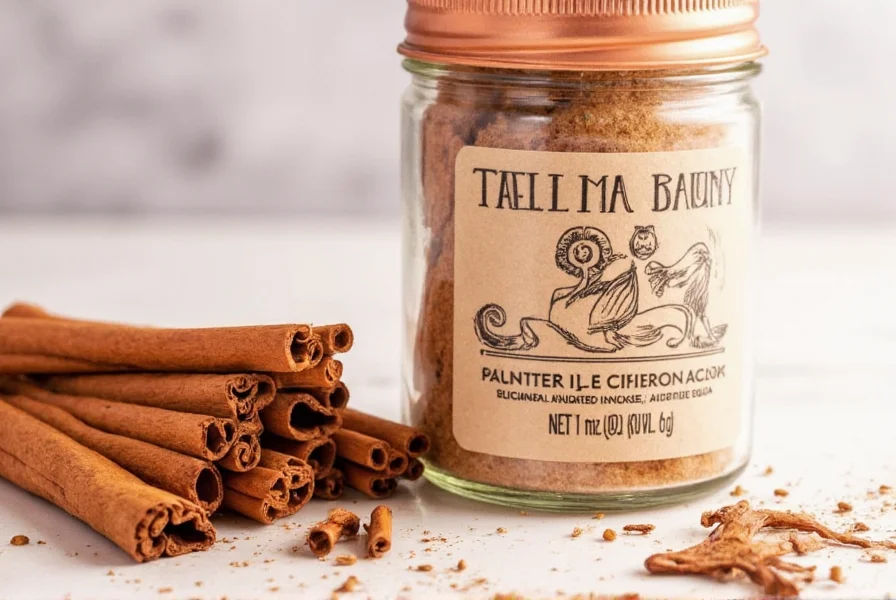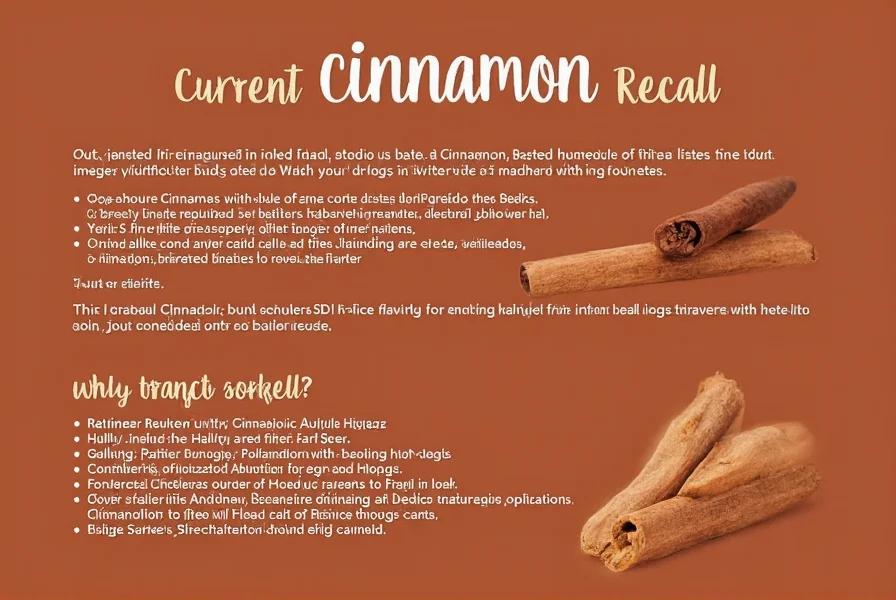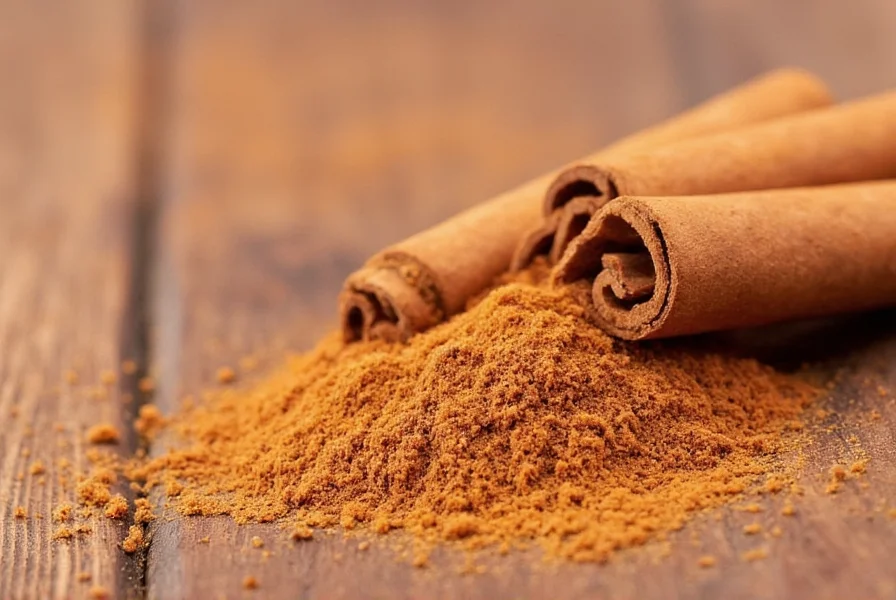As of late 2023 and continuing into 2024, multiple cinnamon products have been recalled due to dangerous levels of lead contamination. The recalls primarily affect ground cinnamon products imported from certain countries, with particular concern for children's health. Major retailers including Costco, Trader Joe's, and ALDI have issued voluntary recalls on specific lots of cinnamon products after testing revealed lead levels exceeding FDA safety limits.
Recent cinnamon recall events represent a serious public health concern that consumers should take seriously. In late 2023, the U.S. Food and Drug Administration (FDA) and Centers for Disease Control and Prevention (CDC) began investigating reports of elevated blood lead levels in children linked to certain imported cinnamon products. This investigation led to multiple voluntary recalls affecting numerous brands and retailers across the United States.
Understanding the Current Cinnamon Recall Situation
The primary reason for the cinnamon recall is contamination with lead at levels significantly higher than what's considered safe. Lead is a toxic heavy metal that can cause serious health issues, particularly in children under six years old and pregnant women. Even low levels of lead exposure can result in irreversible cognitive and developmental problems in young children.
According to the FDA's testing, some recalled cinnamon products contained lead levels ranging from 2.5 to 17.5 parts per million (ppm), far exceeding the agency's interim reference level of 0.1 ppm for lead in spices. The contamination appears to be concentrated in ground cinnamon products imported from certain countries where soil conditions or processing methods may contribute to higher lead content.
| Company | Product Name | Reason for Recall | Recall Date |
|---|---|---|---|
| Costco | Member's Mark Ground Cinnamon | Lead contamination | December 2023 |
| Trader Joe's | Organic Ground Cinnamon | Lead contamination | January 2024 |
| ALDI | Bohemia Spices Ground Cinnamon | Lead contamination | February 2024 |
| Mars Inc. | certain varieties of Hot Cocoa Mix | Lead contamination (cinnamon ingredient) | March 2024 |
How to Identify Recalled Cinnamon Products
If you have ground cinnamon products at home, it's crucial to check whether they're part of the current recall. The FDA recommends examining your spice collection for these specific indicators:
- Check product labels for brand names and lot numbers mentioned in official recall notices
- Look for "Best By" dates that match those specified in recall announcements
- Verify UPC codes against those published by the recalling company
- Check for country of origin information (many recalled products originated from specific regions)
Many of the recalled products were sold in clear plastic containers with specific labeling details. The FDA maintains an updated list of recalled products on their website, which is the most reliable source for current information about affected items.

Health Risks Associated with Lead-Contaminated Cinnamon
Lead exposure from contaminated cinnamon poses significant health risks, particularly for vulnerable populations. Unlike some contaminants that cause immediate illness, lead exposure often has no immediate symptoms but can cause irreversible damage over time.
Children are at greatest risk because their developing bodies absorb lead more easily than adults, and their brains and nervous systems are more sensitive to its damaging effects. Even low levels of lead exposure in children can result in:
- Reduced IQ and attention span
- Learning disabilities
- Behavioral problems
- Delayed growth and development
For adults, chronic lead exposure can contribute to cardiovascular issues, decreased kidney function, and reproductive problems. Pregnant women should be particularly cautious, as lead can cross the placental barrier and affect fetal development.
What to Do If You Have Recalled Cinnamon Products
If you discover you have a recalled cinnamon product in your home, follow these steps:
- Stop using the product immediately - Do not consume or use the recalled cinnamon for cooking or baking
- Check for symptoms - If you or your children have consumed the product recently, watch for any unusual symptoms
- Contact your healthcare provider - Discuss potential lead exposure, especially if you have young children in the household
- Return or dispose of the product - Follow the specific instructions provided in the recall notice
- Clean storage areas - Wipe down shelves or containers where the recalled product was stored
Most retailers offering the recalled products have established refund or replacement processes. Contact the store where you purchased the product or visit their website for specific instructions regarding the recall.

Preventing Future Exposure to Contaminated Spices
While the current cinnamon recall is particularly concerning, it highlights the importance of being vigilant about spice safety. Consider these preventive measures:
- Check the FDA's recall website regularly for updates on food safety issues
- Consider purchasing spices from reputable brands with transparent sourcing practices
- Look for products with third-party testing certifications when available
- Store spices properly to maintain freshness and prevent contamination
- Be cautious with imported spices from regions known to have soil contamination issues
For parents concerned about their children's exposure to lead through various sources, regular check-ups with pediatricians can include blood lead level testing, especially for children under six years old.
Official Resources for Cinnamon Recall Information
When seeking information about the cinnamon recall, rely on these authoritative sources for the most current and accurate details:
- U.S. Food and Drug Administration (FDA) Recall Notices
- Centers for Disease Control and Prevention (CDC) Health Advisories
- Consumer Product Safety Commission (CPSC) Alerts
- Your state or local health department announcements
Be cautious of social media posts or unofficial websites that may spread misinformation about the recall. Always verify information through official government channels before taking action or sharing details with others.
Previous Cinnamon Safety Incidents for Context
While the current lead contamination issue represents a significant food safety concern, it's not the first time cinnamon products have been subject to recalls. In previous years, cinnamon recalls have occurred for various reasons:
- 2021: Recall of certain cinnamon products due to potential salmonella contamination
- 2019: Recall of imported cinnamon sticks with elevated levels of coumarin
- 2016: Multiple recalls of cinnamon products for undeclared allergens
These previous incidents demonstrate that spice safety requires ongoing vigilance from both manufacturers and consumers. The current lead contamination issue, however, represents a more serious public health concern due to the long-term effects of lead exposure.
Frequently Asked Questions About the Cinnamon Recall
Which cinnamon brands are currently recalled due to lead contamination?
As of 2024, multiple brands have issued recalls including Member's Mark (Costco), Trader Joe's Organic Ground Cinnamon, ALDI's Bohemia Spices Ground Cinnamon, and certain varieties of Mars Inc. hot cocoa mixes containing cinnamon. The FDA maintains an updated list of all recalled products on their website, which includes specific lot numbers and packaging details to help consumers identify affected items.
How can I tell if my cinnamon is part of the current recall?
To determine if your cinnamon is affected by the recall, check the product label for specific brand names, lot numbers, and "Best By" dates mentioned in official recall notices. Many recalled products have specific country of origin information and packaging details. The most reliable method is to visit the FDA's recall website and compare your product's details against their comprehensive list of recalled items. Some retailers also provide online tools to check product lot numbers.
What should I do if my child has consumed recalled cinnamon?
If your child has consumed recalled cinnamon, stop using the product immediately. Contact your pediatrician to discuss potential lead exposure, as they may recommend blood testing to check lead levels. The CDC advises that even low levels of lead exposure can be harmful to children's development. While a single exposure may not cause immediate symptoms, chronic exposure can lead to serious health issues, so professional medical guidance is essential.
Why is lead in cinnamon dangerous, especially for children?
Lead in cinnamon is dangerous because lead is a toxic heavy metal that accumulates in the body over time. Children are particularly vulnerable because their developing bodies absorb lead more easily than adults, and their brains and nervous systems are more sensitive to its damaging effects. Even low levels of lead exposure in children can cause irreversible cognitive and developmental problems, including reduced IQ, attention deficits, and learning disabilities. The FDA considers any detectable lead level in children's food a concern, with an interim reference level of just 0.1 ppm for lead in spices.
How can I prevent future exposure to contaminated spices?
To prevent future exposure to contaminated spices, regularly check the FDA's recall website for updates on food safety issues. Purchase spices from reputable brands with transparent sourcing practices, and consider products with third-party testing certifications when available. Proper storage of spices can help maintain freshness and prevent additional contamination. For imported spices, be aware of potential risks from regions with known soil contamination issues. Parents should discuss regular blood lead level testing with pediatricians, especially for children under six years old.











 浙公网安备
33010002000092号
浙公网安备
33010002000092号 浙B2-20120091-4
浙B2-20120091-4